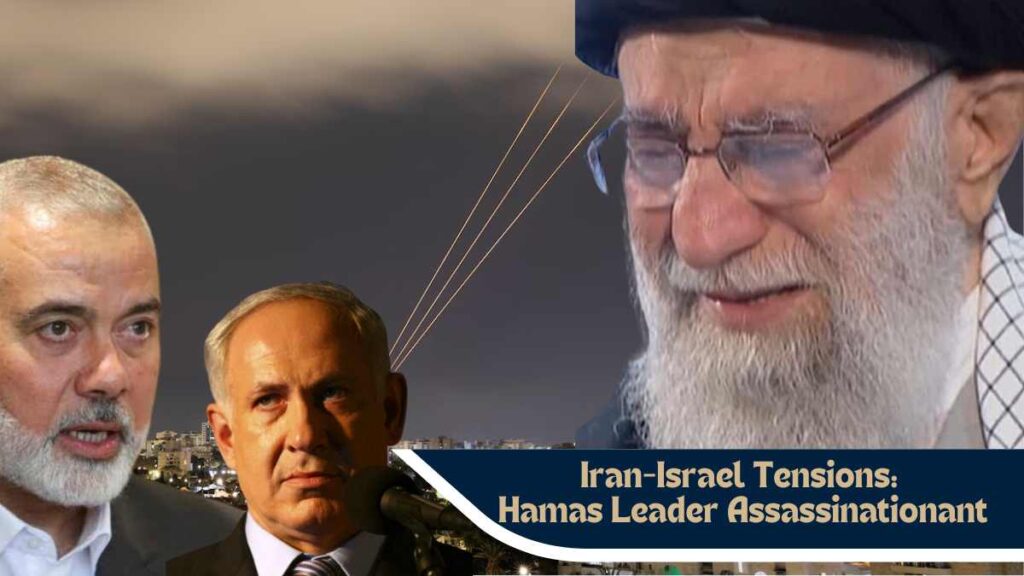Iran-Israel Tensions: The Silent Crisis
The assassination of Hamas leader Ismail Haniyeh in Tehran heightens Iran-Israel tensions, with global geopolitical implications. Discover the U.S. stance and how this event could shift Middle Eastern dynamics.

The assassination of Hamas leader Ismail Haniyeh in Tehran stirs geopolitical tensions between Iran and Israel, with global implications.
The world is currently buzzing with discussions over the escalating Iran-Israel tensions, following a shocking event in Tehran, Iran, where a Hamas leader was assassinated under mysterious circumstances. The leader was reportedly killed in Iran’s capital, and yet, the nation remained unable to respond effectively. The event raises questions about Iran’s security measures and the implications for global politics.

The Incident and Its Implications
The assassination reportedly involved an advanced military operation, with an F-35 fighter jet penetrating Iran’s airspace, launching a missile, and leaving without interference. This event has sparked widespread speculation and discussion in international media, but it remains shrouded in mystery due to the lack of official acknowledgment from the involved parties, adding a new layer to the Iran-Israel tensions.
Israel’s Silence
In a surprising turn of events, Israel has maintained complete silence on the matter. There has been no official statement confirming or denying involvement in the assassination. This silence is unusual, considering Israel’s past practice of claiming responsibility for military actions against adversaries like Hezbollah in Lebanon. This begs the question: why the silence this time amid increasing Iran-Israel tensions?
The U.S. Position on Iran-Israel Tensions
In the wake of the assassination of Hamas political leader Ismail Haniyeh, U.S. Secretary of State Antony Blinken clarified that the United States was neither aware of nor involved in the incident. This statement comes amid growing fears of further escalation in the already tense Middle East. Blinken refrained from speculating on the potential ramifications of Haniyeh’s killing, emphasizing the U.S.’s position of non-involvement. This highlights the delicate balance Washington must maintain as Iran-Israel tensions threaten to spiral into broader conflict, underscoring the intricate dynamics of American diplomacy in the region.
Global Reactions
Several countries have reacted to the assassination with strong condemnations. Russia and China, both influential players in the global arena, have criticized the killing, although neither has directly accused Israel. Russia, a known ally of Hamas, has expressed its disapproval, while China has echoed similar sentiments. Their reactions highlight the complex web of alliances and rivalries contributing to the Iran-Israel tensions.
India’s Strategic Silence
Interestingly, India has also remained silent on the issue. This silence is notable when compared to the outspoken reactions from other nations. India has significant strategic interests in Iran, particularly regarding the Chabahar Port. This port is crucial for India’s trade and regional influence, making its geopolitical strategy more complex. India’s silence may reflect a cautious approach to avoid jeopardizing its interests amid heightened Iran-Israel tensions.
The Chabahar Port Dilemma
India’s involvement in Iran’s Chabahar Port is a strategic move that could alter regional trade dynamics. The port is under a 10-year deal with India, potentially extending to 100 or even 200 years if both countries agree. This deal is crucial for India, offering a gateway to Central Asia and countering China’s influence in the region. However, any escalation in Iran-Israel tensions could complicate this arrangement, especially if the U.S. decides to impose sanctions on Indian companies involved with the port.
Potential Consequences
The assassination has raised fears of further conflict amid rising Iran-Israel tensions. While there is no immediate clarity on whether these tensions will escalate into open warfare, the possibility looms large. Iran’s response to the assassination will be critical in shaping the next steps in this geopolitical saga. Will Iran choose to retaliate directly, or will it opt for indirect actions through proxies like Hezbollah or Hamas?
What Lies Ahead?
The situation is a classic case of geopolitical chess, where every move has far-reaching implications. The key question is how the involved parties will navigate this complex landscape. Will Iran seek revenge, and if so, how will that impact the already fragile peace in the region? Moreover, how will the U.S. and its allies respond if Iran retaliates? These questions are crucial in understanding the potential developments in Iran-Israel tensions.
The Iran-Israel tensions are at a critical juncture. What do you think will be the outcome of this situation? How should the U.S. respond if Iran takes further action? Share your thoughts in the comments below and join the conversation on this pressing issue.
As the world watches closely, the assassination in Iran underscores the delicate balance of power in the Middle East. With major players involved and significant geopolitical stakes, the unfolding events could reshape the region’s dynamics. The silence from key nations like Israel, India, and the United States speaks volumes about the complexities at play. The coming weeks and months will be critical in determining whether this incident leads to a broader conflict or a strategic recalibration by the involved parties.





1 thought on “Iran-Israel Tensions: The Silent Crisis”